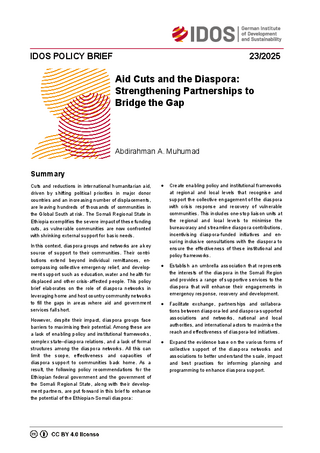Aid cuts and the diaspora: strengthening partnerships to bridge the gap
Muhumad, Abdirahman A.Policy Brief (23/2025)
Bonn: German Institute of Development and Sustainability (IDOS)
DOI: https://doi.org/10.23661/ipb23.2025
Cuts and reductions in international humanitarian aid, driven by shifting political priorities in major donor countries and an increasing number of displacements, are leaving hundreds of thousands of communities in the Global South at risk. The Somali Regional State in Ethiopia exemplifies the severe impact of these funding cuts, as vulnerable communities are now confronted with shrinking external support for basic needs. In this context, diaspora groups and networks are a key source of support to their communities. Their contributions extend beyond individual remittances, encompassing collective emergency relief, and development support such as education, water and health for displaced and other crisis-affected people. This policy brief elaborates on the role of diaspora networks in leveraging home and host country community networks to fill the gaps in areas where aid and government services fall short. However, despite their impact, diaspora groups face barriers to maximising their potential. Among these are a lack of enabling policy and institutional frameworks, complex state–diaspora relations, and a lack of formal structures among the diaspora networks. All this can limit the scope, effectiveness and capacities of diaspora support to communities back home. As a result, the following policy recommendations for the Ethiopian federal government and the government of the Somali Regional State, along with their development partners, are put forward in this brief to enhance the potential of the Ethiopian-Somali diaspora:
• Create enabling policy and institutional frameworks at regional and local levels that recognise and support the collective engagement of the diaspora with crisis response and recovery of vulnerable communities. This includes one-stop liaison units at the regional and local levels to minimise the bureaucracy and streamline diaspora contributions, incentivising diaspora-funded initiatives and ensuring inclusive consultations with the diaspora to ensure the effectiveness of these institutional and policy frameworks.
• Establish an umbrella association that represents the interests of the diaspora in the Somali Region and provides a range of supportive services to the diaspora that will enhance their engagements in emergency response, recovery and development.
• Facilitate exchange, partnerships and collaborations between diaspora-led and diaspora-supported associations and networks, national and local authorities, and international actors to maximise the reach and effectiveness of diaspora-led initiatives.
• Expand the evidence base on the various forms of collective support of the diaspora networks and associations to better understand the scale, impact and best practices for informing planning and programming to enhance diaspora support.
Abdirahman A Muhumad is associated researcher with IDOS and PhD candidate at the Faculty of Social Sciences, Ruhr University Bochum (RUB). He is also a researcher at the Institute of Migration Studies at Jigjiga University, Ethiopia.

